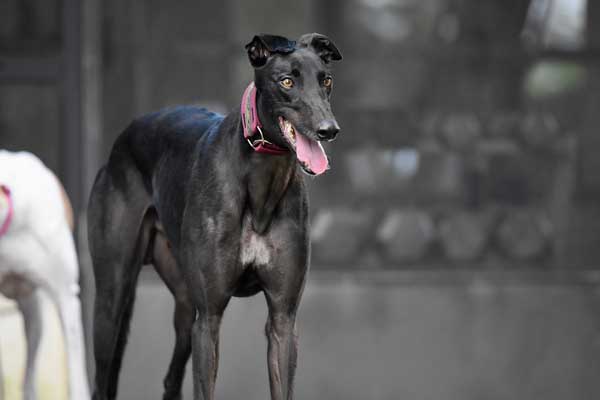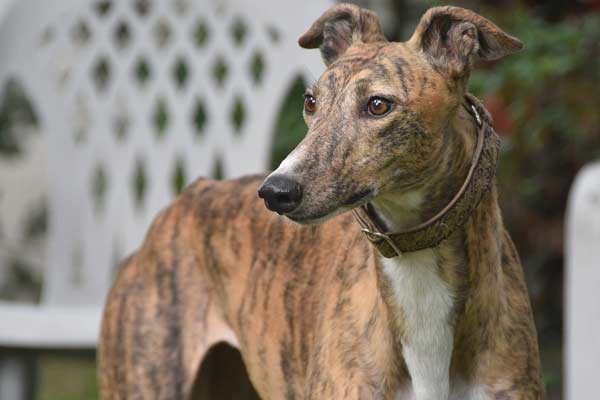How Long Do Greyhounds Live? The Answer Might Shock You!
In this blog post, we’ll explore greyhound lifespan averages, factors that impact lifespan, common health issues in greyhounds and how to prevent them, and the common cause of death in greyhounds so you can adequately care for your pet Greyhound!
Greyhound Lifespan
Greyhounds’ average lifespan is between 10 and 14 years, although it’s not uncommon for them to live well into their teens. Greyhounds are considered a senior at 8 or 9 years old, so extra care needs to be taken when caring for an older dog.
Maintaining a healthy weight throughout the lifespan is crucial to keeping bones and joints healthy.
Greyhounds cope best with a consistent routine, including regular walks, quality food, plenty of rest and stimulation, and vet visits for checkups and vaccinations.
In addition to proper diet and exercise, it’s essential to keep your Greyhound from becoming too stressed or anxious.
Stress can weaken their immune system and make them prone to illness, so it’s necessary to provide a safe, comfortable environment that they can retreat to if needed.
Most Common Cause of Death in Greyhounds
The leading cause of death in greyhounds is cancer, followed closely by old age.
Heart conditions are also fairly common in older greyhound dogs, so it’s important to talk to your vet about monitoring for any signs of heart disease or other issues that could lead to a shortened life span.
You can extend the lifespan of a greyhound by caring for its overall health and well-being.
Taking measures to ensure a healthy diet and regular exercise will help keep your Greyhound in good condition.
Attending vet appointments can help identify any potential illnesses or conditions early on. With proper care, Greyhounds can live long, healthy lives.
Greyhounds Health Problems
Greyhounds are healthy dogs. However, they are prone to specific health issues. These include joint problems, bloat, eye diseases, and heart conditions.
Regular checkups with a vet and maintaining a healthy lifestyle can help reduce the risk of these health issues.
Additionally, it’s essential to know the signs and symptoms of potential problems to address them appropriately if needed.
Greyhounds suffer from oesophageal achalasia, gastric torsion, osteosarcoma, osteogenesis imperfect, and seizure disorders, so it is essential to be aware of these conditions and watch for any signs that your Greyhound may have one of them.
It’s also vital to provide flea, tick, and heartworm prevention for your Greyhound, as these parasites can cause serious health complications.
Keeping up with regular vaccinations and deworming is essential in ensuring your dog remains healthy and safe from disease.
A greyhound’s lifespan can be extended with proper care, and its quality of life can be improved.
In conclusion, greyhounds have an average lifespan of between 10 and 13 years, with the potential to live even longer if properly cared for.
Regular vet visits, a balanced diet, exercise, and flea prevention are crucial to keeping your Greyhound healthy throughout its lifetime.
With proper care, Greyhounds can live long, healthy lives. Spending time understanding their needs and providing a quality lifestyle will ensure that your Greyhound will enjoy many years with you as part of the family.
Additionally, providing an environment free from stress and anxiety can help keep your Greyhound happy and extend its life. With the proper care, greyhounds can live long, healthy lives.
How to Care for a Greyhound
Caring for a Greyhound is not complicated, but it does require responsibility and effort.
Greyhounds need regular exercise, quality food, and socialization to stay healthy and happy.
First, ensure you provide your Greyhound with at least two daily walks or runs. Greyhounds need a minimum of 30 minutes of activity each day to stay fit and healthy.
It’s also important to provide variety in the types of exercise they get, such as going for walks on different terrain or playing fetch with unique toys designed for their breed.
Besides physical activity, nutrition is another vital component of your Greyhound’s health.
Quality dog food specially formulated for Greyhounds is best, as it contains essential vitamins and minerals tailored to their breed’s needs.
You should also keep a close eye on how much your pet eats daily and adjust their diet as needed.
Finally, it’s essential to provide socialization opportunities for your Greyhound. Doing so will help improve their social skills, prevent anxiety, and keep them from getting bored or destructive.
Greyhounds are affectionate and energetic, providing plenty of time for playtime with other dogs and humans.
Greyhound Breed History
For centuries, the Greyhound has been an iconic breed that has captivated and inspired people worldwide.
These elegant and noble animals have a long and fascinating history that dates back 8000 years.
Historically, greyhounds have been highly prized by royalty and used as hunting companions in ancient Egypt, Greece, and Rome.
Greyhounds were even mentioned in the Bible several times, celebrated by figures such as Christopher Columbus and Queen Elizabeth I, and immortalized by William Shakespeare in his play Henry V.
American Kennel Club established Greyhound racing as an official sport in the late 1885s. United Kennel Club recognized the breed in 1914.
Today, the Greyhound is still broadly similar to its ancient ancestors and is a popular choice as a family pet.
They are well known for their graceful running ability and make great companions for active lifestyles and home relaxation—no wonder they have continued to be beloved companions for centuries.
Experience the grace and beauty of this timeless breed for yourself! The Greyhound will make you proud whether you’re looking for a loyal friend or an exciting running partner.
How Much Does a Vet Visit Cost?
Visiting the vet for your dog can be expensive, and you may wonder how much a vet visit will cost.
The cost of veterinary care has been steadily rising in recent years, but generally speaking, a routine veterinary exam typically averages between $50 to $100.
Other services like dental cleanings and grooming can range from $50 to several hundred dollars, depending on the required service type. For instance, if your dog needs x-rays or blood work, you can expect to pay anywhere from $100 to $500.
However, the cost may be higher if your dog needs additional veterinary care, such as vaccines, tests, or treatments.
Additionally, if your dog requires surgery or hospitalization due to an injury or illness, you should budget for a minimum of $500 and up to several thousand dollars.
If prescription medications are needed, the cost will vary depending on the medication dosage and frequency. Discussing all fees with your veterinarian before administering any treatment is always best.
When it comes to veterinary care, prevention is critical. Keeping your dog’s vaccinations up-to-date, providing flea and tick preventatives, and maintaining good oral hygiene are all essential steps to protect your pet’s health.
Regular checkups and preventive health care can help you avoid more costly services in the future.






